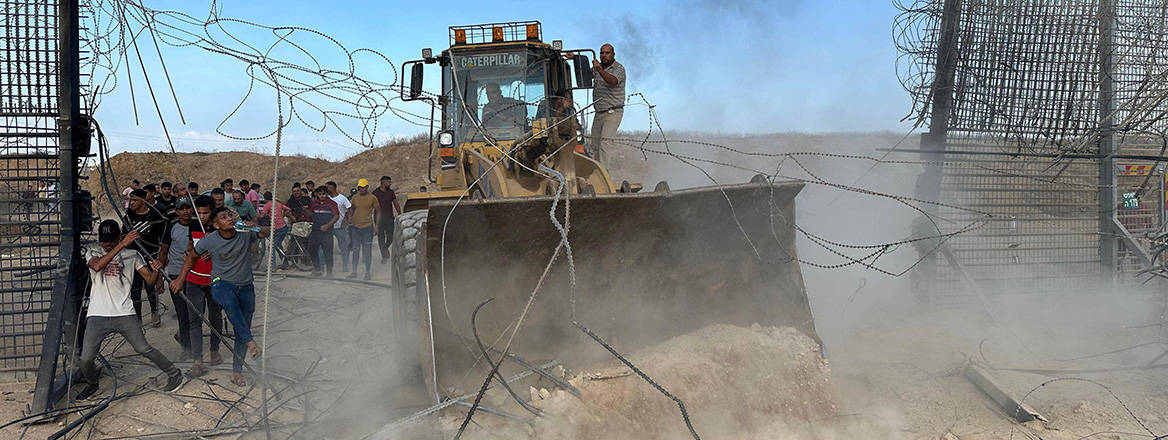Should the UK Defund Organisations Whose Personnel Commit Serious Crimes?
The UK recently joined several other countries in withdrawing funding from a UN aid agency in response to Israeli allegations of crimes linked to Hamas. This paper considers the intent behind defunding as an approach, its potential security impacts and options for responses to similar cases in future.
On 26 January, Israeli officials published a dossier alleging the involvement of UN Relief and Works Agency (UNRWA) personnel in the Hamas-led attacks on the 7 October 2023. Following these accusations, UNRWA dismissed the surviving employees (two were already dead and one remains unnamed) and reiterated its condemnation of the attacks. The Israeli government faced criticism for the very limited published evidence backing its claims, and a recent UNRWA report claimed that confessions were coerced. Despite public qualms, the US immediately withdrew funding from UNRWA and (as of 4 March) 16 other donor countries have followed suit, including the UK. There is little precedent to help gauge whether this is the right response, especially as the egregious nature of the crimes perpetrated on 7 October makes comparison with other organisational scandals difficult. UNRWA’s status as an International Organisation (IO) means it has a different relationship with the UK government compared to, for example, a charity. It is also apparent that there is no international consensus on the best approach; the EU, Qatar and Iraq increased funding in response to these cuts, and there are reports that some of the 16 countries are reviewing or reversing their decisions. This commentary explores previous responses to crimes committed by staff members of large organisations, relevant security considerations while framing a response, funding bodies’ options and recommendations regarding future responses.
Has the UK Government Historically Displayed a Consistent Approach?
In some ways, the UK government’s reaction echoes its response in 2018 to a sex abuse scandal involving Oxfam workers in Haiti. Then, as now, the UK government immediately withdrew funding and called for organisational reform. Funding was reinstituted briefly in 2021, almost immediately withdrawn again after similar allegations from the Democratic Republic of Congo, and reinstated for a second time in 2022. Yet financial sanctions do not appear to have been the conventional historical response of UK governments. It was certainly not the case for the NHS when it failed to prevent the murder of at least 215 patients by Harold Shipman. The BBC was not fined for its failure to respond to warnings about Jimmy Saville. Both of these must surely have exceeded the threshold for criminality that was displayed by Oxfam, and yet neither organisation was held to account in the same way. So, is the decision to defund UNRWA based on the nature of the alleged crimes, the nature of the organisation (and so UK government options to influence it), an example of strategic communication (showing solidarity with Israel) – or is it simply a case of absent policy?
While Oxfam International is a confederation of non-governmental organisations (NGO), its secretariat is registered as a foreign company limited by guarantee in the UK. The BBC is a state-owned corporation, and the NHS is a mix of public bodies and commercial organisations. While the government has other levers over the BBC and the NHS, the fact that there was no formal censure of either in the Shipman and Saville cases (in addition to demands for reform) suggests an inconsistent approach.
Security and Humanitarian Impacts of Defunding
What is the impact on the operations of the organisation in question? What good was it doing with the money, and therefore, by extension, what good can it not do now? Critically, in the context of Oxfam supporting development in Africa, or aid in Gaza delivered by UNRWA, what are the immediate short-term harms to the supported populations, and what, if any, are the risks to stability from a sudden shift in the provision of basic services? Do the potential long-term organisational improvements driven by defunding outweigh any shorter-term risks to health and security?
The enforced curtailment of UNRWA’s operations coincides with the worst humanitarian crisis the Gazan population has ever faced
In FY2023, the US paid $371 million to UNRWA, and it has paid $121 million so far in FY2024. The pause also affects $2.8 million in previously promised funds. In effect, UNRWA will lose more than $1 million a day of US support alone. The other countries which had stopped funding by the end of January account for more than half of UNRWA’s estimated annual budget of $1.1 billion. As a result, it is now ‘functioning hand-to-mouth’, with its food, education and healthcare services at risk of collapse in Gaza, the West Bank, Lebanon, Jordan and Syria.
This enforced curtailment of UNRWA’s operations coincides with the worst humanitarian crisis the Gazan population has ever faced. A quarter of Gaza’s population of 2.3 million faces imminent famine, while nearly all Gazans face acute hunger or starvation, to say nothing of disease and continued Israeli bombardment. This dire situation would be exponentially exacerbated by the looming offensive into Rafah, where 1.5 million Gazans are trapped. A further reduction in aid endangers hundreds of thousands of civilian lives. The diminution or removal of UNRWA, which is considered the only ‘organization [with] a meaningful presence inside Gaza’, will also create a vacuum in the control of aid, which is likely to be filled by the only other major organisations on the ground – Hamas and other militant groups. This may strengthen their position through increased contact with and control over the populace.
Defunding could also cost geopolitical influence. Some of the funding gap is being filled by private donors and smaller NGOs, making oversight and governance of the aid ecosystem far harder than when UNRWA had a larger role. Finally, as was the case when the US withdrew from UNESCO in October 2017, some of the funding slack may be taken up by other states with their own agendas. China increased its share of UNESCO funding to 15%, and then used its enhanced influence to focus support ‘on vocational and job training programs in countries partnering with China on the Belt and Road Initiative (BRI), as well as a partnership with the Chinese Academy of Sciences’.
To Sanction or Not to Sanction
Is this all just strategic communication? In cutting funding, the UK is clearly distancing itself from the actions of those 12 personnel, although this could have been achieved through condemnation alone. Perhaps the financial penalty is an attempt to indicate the UK’s horror at the attacks themselves. And yet, as noted, this was not applied to the BBC, the NHS or even Defence after the death of Baha Mousa. From a strategic communication perspective, consistency of values is critical. Western governments degrade their reputation for respecting human rights whenever they display such double standards. Defunding a UN organisation also muddies the UK’s own narrative regarding the ‘rules-based international order’, something it has especially emphasised in the face of Russia’s flouting of international norms and laws.
No matter how good their processes, large organisations will take on malicious or dangerous people
The other element of the strategic communication argument is when it contributes directly to narratives about the conflict. UNRWA had already announced (on 17 January) that it was commissioning an independent review of itself in response to Israeli allegations that its facilities and resources were being used by Hamas. The organisation wanted to address allegations that UNRWA was not adhering to its mandate of neutrality, and it is entirely possible that the concerns at this time included potential employee involvement in the 7 October attacks. However, Israel didn’t make its allegations public until more than a week afterwards, on the same day that the International Criminal Court (ICJ) provisionally ruled on the South African case alleging Israeli-perpetrated genocide of the Palestinian people. The timing suggests an attempt to shift attention away from the ICJ case in a battle to control the narrative. This clearly succeeded, in no small part due to Israel’s allies; the UK released its statements on the ICJ hearing and the UNRWA funding suspension on the same day. Meanwhile, UNRWA said that it ‘has long been subjected to misinformation and disinformation including about its staff and operations’ in an extensive rebuttal of claims about its relationship with Hamas. Two important but separate issues – an ICJ ruling and the accountability of a major IO – have become lost in a competition for control of a different narrative: that of whether the ongoing action in Gaza is right.
Perhaps most importantly, there is very little research into whether defunding works. The UN unsurprisingly feels that defunding is wrong. Certainly, there is evidence that the threat of it from a large donor can enforce change, but achieving such an effect requires persistent donor engagement. Clearly, a donor that withdraws is not as engaged as a donor that sets conditions for ongoing support. It is also worth noting that only half of the top 10 UNRWA donors cut their funding; the EU, Norway, France, Saudi Arabia and Turkey have not, at least until they see the results of the investigation. This ‘wait, see and set conditions’ approach is the one most likely to actually translate into organisational reform.
Evil People in Good Organisations
No matter how good their processes, large organisations will take on malicious or dangerous people. While Oxfam may have been the best known example, concerns have been raised about other organisations within the aid sector, including Save the Children (UK), Mercy Corps, World Vision and even Prince Harry’s charity. The problem of abuse by UN peacekeepers is well recognised, and even UNICEF has been censured for failing to stop it. This does not change the fact that these organisations do far more good than harm. The Oxfam report recognised that effective vetting cannot keep all those who intend to cause harm out of an organisation – rather, the organisational culture and processes must focus on dealing with such individuals effectively as soon as they are detected. Intentional infiltration by hostile groups may happen, but even if this was not the case here, given that 90% of the emergency humanitarian workforce consists of local nationals and that Hamas is the political authority in Gaza, UNRWA could never have ensured that no employees had ties to the militant group.
Potential Solutions
The best initial action must be to rapidly and forcefully denounce any involvement in the crimes, and then to ensure that the nature of the problem is immediately, thoroughly and independently investigated. If there are found to be systemic issues within the organisation, then empirical evidence suggests making ongoing support conditional on demonstrable, timely progress towards the necessary end state. Failure to make the required progress should result in predetermined and explicit sanction – either defunding or replacement (such as by a trusted organisation or the UN General Assembly implementing an entirely new structure). This approach would deliver positive action to prevent a recurrence, while not harming the supported population or feeding insecurity. Critically, this policy can be applied to any organisation – UK-based or international – allowing consistency of messaging about what the UK will tolerate, and what it will not.
The views expressed in this Commentary are the authors’, and do not represent those of RUSI or any other institution.
Have an idea for a Commentary you’d like to write for us? Send a short pitch to commentaries@rusi.org and we’ll get back to you if it fits into our research interests. Full guidelines for contributors can be found here.
WRITTEN BY
Noah Sylvia
Research Analyst for C4ISR and Emerging Tech
Military Sciences
Dr Emma Butcher
Senior Programme Manager
Military Sciences
Si Horne
Former British Army Visiting Fellow
- Jim McLeanMedia Relations Manager+44 (0)7917 373 069JimMc@rusi.org




